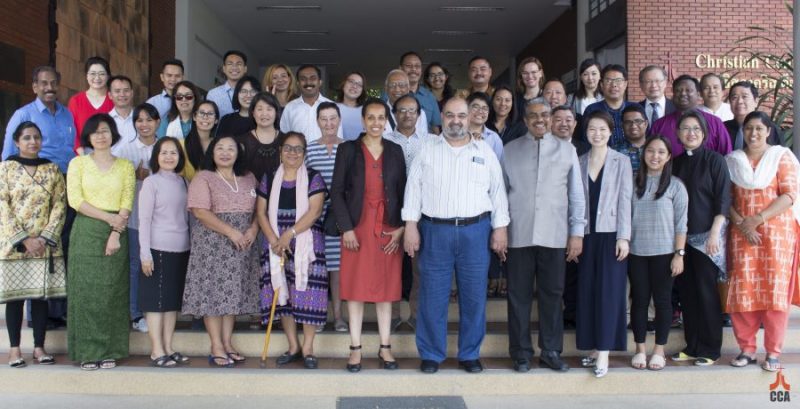International ecumenical consultation discusses on how stateless and trafficked people pose serious threats to humanity and the tenets of international law
 Participants of the International Consultation
Participants of the International Consultation
An international consultation on ‘Statelessness and Human Trafficking in Asia: Prevention, Reduction, and Protection’ being held from 20 to 23 May, 2019 at the CCA headquarters and jointly organized by the World Council of Churches (WCC) and the Christian Conference of Asia (CCA) began with discussions on the grave consequences of statelessness and human trafficking, including smuggling and trafficking of migrants and refugees in Asia.
Delivering the keynote address at the opening session, the CCA General Secretary Dr. Mathews George Chunakara stated, “The increasing number of stateless and trafficked people poses serious questions and challenges to humanity and to the tenets of the international law and its principles. As transnational migration has increased in recent years, more stateless people are also smuggled or trafficked in Asia and they are forced to work in hazardous jobs in different Asian countries”.
There are over 10 million stateless people in the world, 40 percent of whom are in Asia. Of the 36 million people who are trafficked in the world, more than 23 million of them are in Asia. Despite these challenges, the churches in Asia in general have neither adequately understood the complexities of this problem nor responded properly to address the vulnerability of the deplorable situations of the stateless and trafficked people”, added the CCA General Secretary.
Dr. Mathews George Chunakara further stated, “The Asian churches have not responded more specifically in the cases of the plight of the Rohingyas from the Rakhine state in Myanmar and the four million people living in Assam for generations who have been arbitrarily excluded from the National Register of Citizens (NRC) of India, rendering them stateless in one fell swoop. However, both WCC and CCA have been trying to sensitize the Asian churches to raise their prophetic voice as a response to these burning issues”.
Segma Asfaw, programme executive for international affairs of WCC in an introductory address traced the history of the ecumenical involvement in addressing the concerns of the stateless and trafficked people and the advocacy on combating the statelessness and trafficking in the world.
“The programmes related to the Pilgrimage of Justice and Peace initiatives of WCC invited the churches to feel God’s presence by being with and serving the wounded, including the stateless and trafficked persons; this will be a transformative experience to include the stateless and trafficked people in our community of pilgrims”, said Ms. Asfaw.
The international consultation opened with a liturgical service focused on the CCA initiated Asia Sunday – 2019 theme ‘Stateless and Trafficked People: Our Co-Pilgrims’.
More than 40 participants representing CCA and WCC member churches, national council of churches, civil society organisations, academic and research centres, and women’s organisations are attending the consultation.
Bongkot Napaumporn of the United Nations High Commission for Refugees (UNHCR) presented the legal framework of statelessness in relation to the right to a nationality, and explained how gender discrimination in nationality laws were affecting women in Asia, and also how birth registration was a tool to prevent statelessness.
Led by Dr. Saw Alwyn, four stateless persons from the Mae La Refugee Camps on the Thailand-Myanmar border gave a first-hand testimony of stateless people living in the camps for over 22 years.
The topics covered during the first day’s sessions included ‘Convention Relating to the Status of Stateless People: International Framework and the Right to Nationality’, ‘Statelessness in Asia: an Overview’, ‘Gender Discrimination in Nationality Laws affecting Women in Asia’, ‘Statelessness and Nationality Laws in Comparison (Malaysia, Jordan, and Bahamas), and ‘Forced Marriagae and Statelessness in Pakistan’. Dr. Audeh Quawas, Andrew Khoo, Bongkot Napaumporn, Lalita Yawangsan, and Sunila Ammar presented case studies.










